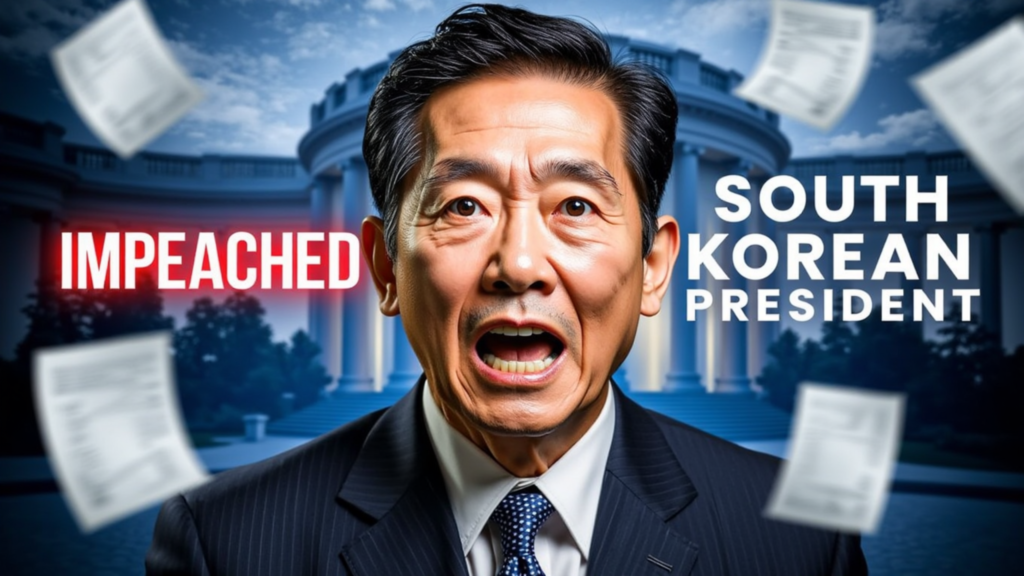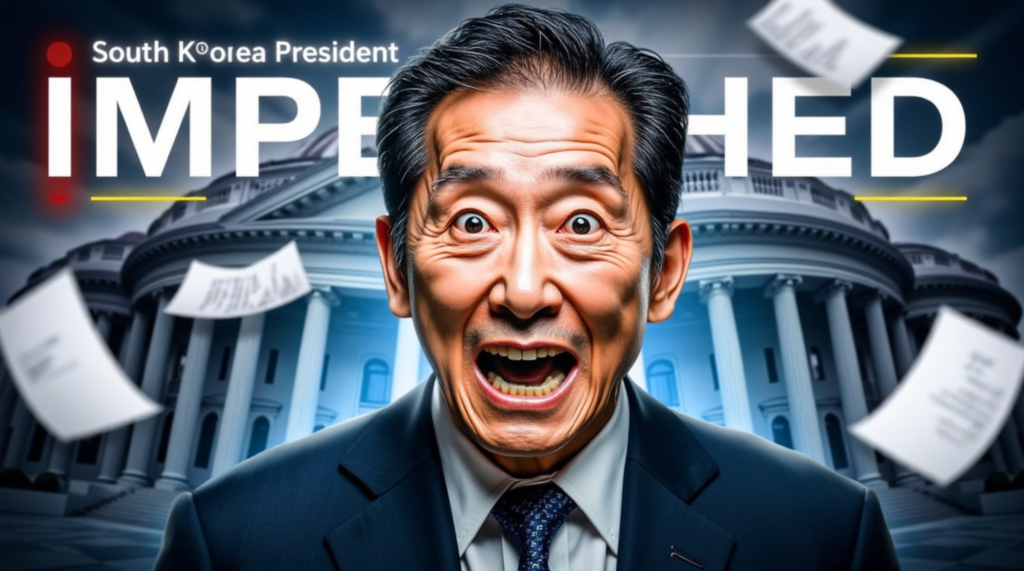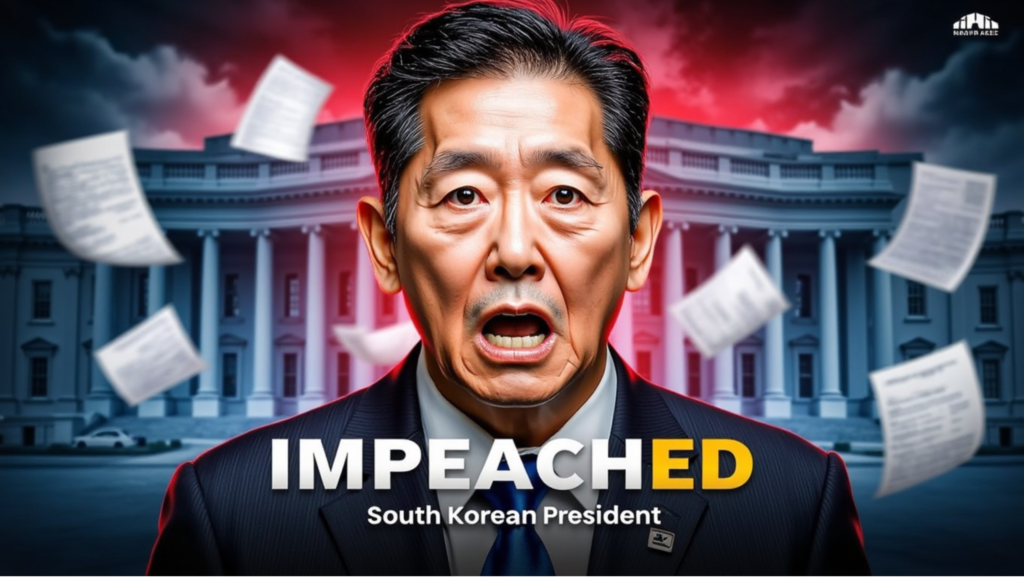
| Section | Details |
|---|---|
| Introduction | Overview of South Korea’s parliamentary vote to impeach President Yoon Suk Yeol and the political uncertainty it causes. |
| What Led to the Impeachment Vote? | Reasons for the impeachment include public dissatisfaction with Yoon’s handling of economic issues, foreign policy, and corruption allegations. |
| The Political Dynamics in South Korea | The country is politically polarized, with conservatives supporting Yoon and liberals pushing for his removal. |
| What Happens After the Vote? | The impeachment case is sent to the Constitutional Court for review, where it has 180 days to decide its validity. |
| The Impact on South Korea’s Democracy | Explores how the impeachment process reflects the strength of democratic institutions and the potential for political instability. |
| What Does This Mean for Yoon Suk Yeol’s Future? | Yoon’s future depends on whether the Constitutional Court upholds the impeachment or dismisses it. |
| What’s Next for South Korea? | Analyzes potential scenarios for South Korea, including the possibility of a new presidential election. |
| Conclusion | Summarizes the significance of the impeachment vote, its implications for Yoon, and the future of South Korea’s political landscape. |
South Korea’s politics were shaken by last week’s parliamentary vote to impeach President Yoon Suk Yeol. The nation is in shock, pondering what lies in store for the presidency, democracy and the country itself and the Republican party. With the tensions rising and still uncertainty in the air, it’s important to understand what this is, put in the political environment that this decision is put in, and what the possible outcomes are.
What We’re Hearing From Various Industry Experts About This Backlash Now and Into the Future
For some months and now, people have been growing dissatisfied with President Yoon’s administration. Though he has been slammed for his view of handling the economy and the overseas strategy decisions. They are on the hook for the impeachment proceedings over accusations of corruption and abuse of power. But rising inflation and unemployment, as well as widespread corruption and accusations of mismanagement have added to the public discontent threatened by accusations the country had failed to address key national issues.
Yoon won election, assumed office and the presidency has been turbulent for him since last May. Living with rising unemployment and inflation, his government was hard at work dealing with economic terms. People reacted to his foreign policy decisions — what should be done with North Korea and with the United States — both domestically and internationally. Until a parliamentary vote to impeach him, his administration had provoked widespread protests and appeals to oust him from the public.

South Korea: The Political Dynamics
The impeachment of Yoon is yet another part of South Korea’s political crisis – a country in turmoil. But on the other side Yoon is backed by powerful conservative factions who view his leadership as crucial for south Korean stability and security. But it has created unease among liberal groups, who fear he has damaged the country’s progress and democracy.
Some research has more seats for opposition party and opposition party had played role in impeachment vote itself. It was met with criticism from the opposition, which has long berated Yoon for what it calls a failed and controversial presidency.
Then, That’s What Happens After The Vote
But that parliamentary vote itself is only the first step of impeachment process. South Korea must impeach by a motion of the National Assembly, after which the court must act. The impeachment process is up for 180 days to the body to decide on its validity. If the court approves the motion, Yoon will be automatically kicked out of the presidency and a new election will be held. But, if the court invalidates impeachment, Yoon will stay president, and political volatility would almost certainly dissipate, for the time being.
If the Constitutional Court proceeds it would be the first in South Korean political history. The impeachment would be the second time a sitting president has been impeached, the first being ex President Park Geun Hye in 2017. He may further prolong a political crisis and its effects on our home and foreign relations.
South Korean Democracy: Implications
The peaceful change of power and a clean record is celebrated as extremely robust Korean democracy. It knows that that vote reveals divisions in its political system. But it’s also another example of South Korea’s democratic institutions standing strong — the National Assembly, which was just able to call out its own president. It also asks whether political instability and public trust in elected officials is being corroded.
The vote to impeach Park and, consequently, the ruling by a Constitutional Court on her unfitness to hold the presidential office will haunt South Korean politics long into the future. It will put strain on the resilience of its democratic institutions, and it will raise questions about how this tension between the presidency and the National Assembly, and the judiciary, is resolved.
I’m going to talk about Yoon Suk Yeol’s Future.
Will this or that change perishes or not?
The simplest terms of Yoon Suk Yeol’s future.
Whether to approve planned impeachment proceedings against President Yoon will decide his future. For even if he gets overturned by the Constitutional Court his already brief presidency will be curtailed many weeks there and he will then have to contend with the disadvantages of being the chief. Yoon can likely count on remaining in office if the court acquits him of the charges, but will remain the target of political scrutiny. The question is whether or not his stunts will pass muster after the vote on impeach, given his ability to maintain division, regain public trust.
Either way, Yoon’s political career will be different. While the vote did not unseat the leader, it serves as a reminder to his administration and South Korea’s wider political class of how unpredictable South Korean politics has become and the number of barriers the leader faces in a nation that has historically split its voting preferences.

South Korea is that place.
In the coming days it will clarify South Korea’s immediate future in terms of its presidency as the impeachment process moves forward. Constitutional Court decision to uphold impeachment of Park creates new chapter in South Korea’s political history and tips Park in a presidential election. Of course this sort of thing could potentially trigger a policy course change based on the results of this vote and the candidates that emerge against Yoon and his space.
Meanwhile, major challenges await South Korea to overcome: In Britain left economic turmoil, security worries and internal rivalries. Regardless of what Yoon does, whether he stays or goes, the country will have to travel down the road of having to overcome its political divide. This week the nation’s watched as the constitutional review unspools to see what’s next.
Conclusion
A such momentous moment in the history of politics of South Korea. The process is likely to either come to a clear result or not, but it has already been a big part of the country’s political story. Of course, we’re taking it a reminder that elected officials had some big problems to solve, and a reminder that accountability is critical to a functioning democracy. South Korea now looks forward and the nation will have to reconcile itself in the aftermath of an extraordinary political crisis and what that means for President Yoon and the country’s future.
FAQ
1. What has South Korea’s parliament voted to impeach President Yoon Suk Yeol over?
The vote comes as President Yoon faces growing public discontent over handling of key national issues, such as economic troubles, corruption allegations and disputes over foreign policy. Protests and calls for his removal helped push the parliamentary vote.
2. So what happens after the parliamentary vote to impeach the president?
When the parliamentary vote is over, the impeachment case is sent to the South Korean Constitutional Court. The court now has up to 180 days to assess the case and make a ruling as to whether the impeachment is legitimate. If the court upholds the impeachment, President Yoon’s presidency will be ended and a new election will be held.
3. How does South Korea impeachment work?
The president is voted to impeach by the National Assembly. The case is sent to Constitutional Court to be reviewed if the motion passed. This must be decided by the court within six months whether the impeachment is to stand or not to stand.
4. The impeachment, though, what are the political dynamics surrounding it?
The political landscape of South Korea is split. President Yoon, who’s heavily backed by conservatives for his leadership in national security and economic stability, is said to have swept far more countryside seats. But liberals, who dominate the opposition, accuse his administration of poor economic management and of not dealing with public complaints, prompting the motion to impeach him.
5. what could be the impact of impeachment on South Korea’s democracy?
The impeachment itself points to the girding support of the South Korea’s democratic institutions, including its ability to hold a sitting president accountable. But it also has political risks of instability and a divided nation if it fuels old splits between the political classes.
6. So what will happen to President Yoon if the Constitutional Court dismisses impeachment?
On the other hand, if the Constitutional Court disbands the impeachment, President Yoon will remain president and continue his presidency. However, public dissatisfaction will continue, and his leadership will probably continue to be subject to analysis, and will likely come under pressure.
7. What would the impeachment mean for South Korea’s future?
A new South Korean presidential election in the event that the impeachment is upheld could change the country’s political course. And even though the outcome is uncertain, the process could, through any which way, help deepen political fractures and shape the path ahead for the nation’s policies.
8. How have people responded to the vote on impeachment?
There has been a polarization of public reaction. Opponents of Yoon say the impeachment is politically motivated, while backers think it is what is needed to help restore democracy and accountability. Supporters and opponents of impeachment have all held protests and demonstrations.
9. Before, has South Korea ever impeached a president?
Previously, South Korea impeached President Park Geun hye in 2017 over a corruption scandal. Park was impeached by south Korea’s Constitutional Court, stripping her of her power as president.
10. After the impeach vote, what is next for South Korea?
But South Korea will hold a new presidential election if the court upholds the impeachment. If however the court does dismiss the motion, Yoon will remain in power, but in a nonetheless tense political climate.


